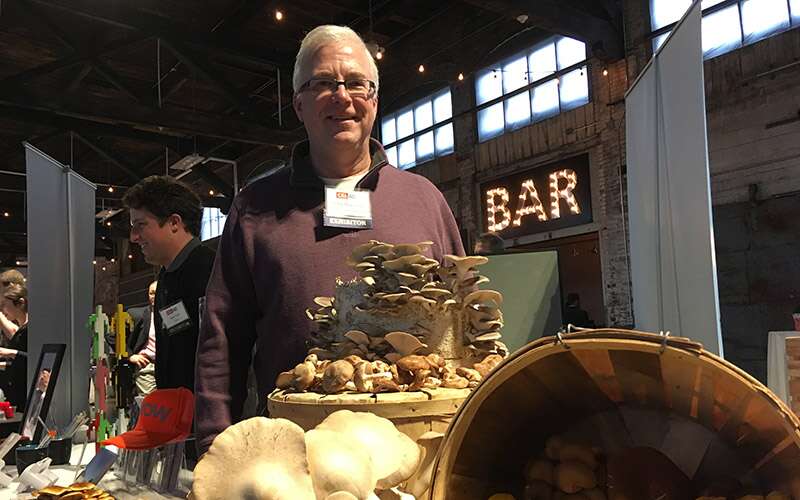
'Mission is far from over' as CEI marks 40th anniversary
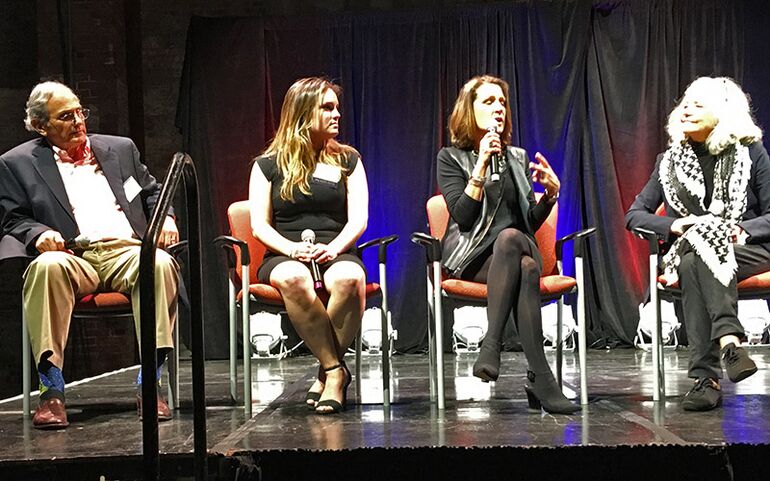 Photo / James McCarthy
Mil Duncan, author of “World's Apart: Poverty and Politics in Rural America,” at far right, leads a panel discussion with (from far left) Carlos Quijano, founder and chairman of Coast of Maine Organic Products; Kelly Brewer, director of network engineering and implementation at Tilson; and Suzette McAvoy, executive director of Center for Maine Contemporary Art. The discussion took place at CEI's recent 40th anniversary celebration, held at Thompson's Point in Portland.
Photo / James McCarthy
Mil Duncan, author of “World's Apart: Poverty and Politics in Rural America,” at far right, leads a panel discussion with (from far left) Carlos Quijano, founder and chairman of Coast of Maine Organic Products; Kelly Brewer, director of network engineering and implementation at Tilson; and Suzette McAvoy, executive director of Center for Maine Contemporary Art. The discussion took place at CEI's recent 40th anniversary celebration, held at Thompson's Point in Portland.
In 1978 Ron Phillips planted the first seed of his newly created economic development organization’s vision of creating opportunities for Maine people and communities left out of the economic mainstream with Coastal Enterprises Inc.’s investment in the Boothbay Region Fish and Cold Storage facility.
That investment helped rebuild a facility recently destroyed in a fire, saving not only an important Boothbay Harbor employer but also making a strong statement about the importance of working waterfronts to Maine’s coastal communities.
Fast forward 40 years. The seeds of community economic development sown by CEI since its founding by Phillips have multiplied a hundredfold, with more than 2,700 businesses financed, almost 38,000 full-time jobs created and roughly 56,000 people receiving business counseling.
“But our work is not yet done,” CEO Betsy Biemann told 570 guests at the nonprofit’s recent 40th anniversary celebration at Brick South on Thompson’s Point in Portland. “In fact, it’s more important than ever.”
Besides the guests, the expansive Brick South Events & Catering building was filled with dozens of businesses and expo tables displaying products and flyers — including Gelato Fiasco, Blue Ox Malthouse, Ocean Renewable Power Co., Tilson Technology — each and every one having benefited in some way from CEI’s financial support and business counseling services.
Poverty and politics in rural America
Biemann’s opening remarks at the event set the stage for a panel discussion led by Mil Duncan, author of “World’s Apart: Poverty and Politics in Rural America,” who was joined by Carlos Quijano, founder and chairman of Coast of Maine Organic Products; Suzette McAvoy, executive director of Center for Maine Contemporary Art; and Kelly Brewer, director of network engineering and implementation at Tilson.
“Rural America has been the canary in the gold mine [for the general loss of manufacturing jobs in the United States],” Duncan said.
That loss, she added, compounds the general trends in rural America of having limited or negative population growth and a greater number of people living in poverty. “Places don’t choose to be undeveloped,” she said. “What they need is investment. Rural America is not lost. Rural America can thrive.”
Duncan said community development financial institutions like CEI play a key role in helping to turn around those trends in rural America, adding that different investment strategies are required for different regions. One size doesn’t fit all, which is why CEI’s spectrum of financing and venture capital tools, as well as its array of programs ranging from business counseling to workforce development, is essential to ensuring it meets its goal of creating good, sustainable jobs for rural communities.
McAvoy credited CEI with providing financing at a critical time, which enabled the Center for Maine Contemporary Art to move from its longtime home in Rockport into a modern $5.2 million museum building in Rockland designed by internationally recognized architect Toshiko Mori that opened in June 2016.
The impact has been immediate: In Rockport, she said, CMCA averaged 9,000 visitors per year; in 2017, it had more than 40,000 visitors — winning the Governor’s Award for Tourism Excellence, the highest honor given by the Maine Office of Tourism, for the impact it’s having on Rockland’s vibrant arts scene.
Tilson’s Brewer said the Portland-based information technology consulting firm had 50 employees in 2013, when CEI became its first outside investor. It now has more than 400 employees across the country — including 100 employees at its new $4 million Portland headquarters — and projected sales of $77 million in 2018. “We focus a lot on innovation, industry-leading technology,” Brewer said.
Carlos Quijano, who founded Coast of Maine Organic Products in 1996, received an early $25,000 CEI loan and a grant from Eastern Maine Development Corp. to get his organic compost company started. Sales increased every year, to the point where a little more than a year ago the company merged with Frey Brothers Inc., a farm-product supplier based in Quarryville, Pa.
The merger gives Coast of Maine the opportunity to expand its reach from New England into the Mid-Atlantic states
Pioneers of tomorrow's economy
To start off its next 40 years, Biemann said CEI is developing a new strategic plan to grow the rural economies of Maine and in other rural regions of the country. “We’re always asking ourselves, ‘How can we expand economic opportunities where they are most needed?” she said. “We’re fortunate to work with the pioneers of tomorrow’s economy.”
Here are a few of the pioneers in Maine who’ve been helped by CEI:
Mousam Valley Mushrooms

John Sharood started Mousam Valley Mushrooms, a family farm in in Springvale, five years ago with money raised from angel investors, a seed grant from Maine Technology Institute and investments from Maine Venture Fund and CEI.
Sharood said he brings to the family business a background in startup businesses, specializing in software-systems. His son, Robert, is the farm’s mycologist and head of quality control and his daughter, Emily, is director of marketing and design director.
The mushroom-growing operation is located inside a historic dairy barn on a 12-acre farm above the Mousam River Valley in Springvale. All its oyster and shiitake mushrooms are certified organic by both the USDA and Maine Organic Farmers & Gardeners Association.
Sharood says the business is in the “expansion stage,” having topped $1 million in sales and now employing 15 people.
He credits CEI with being more than a source of financing. “If you’re a small company it’s very difficult to get the money and also the technical support from one entity,” he says. “CEI has experts in both of those areas and they also are great about introducing you to other people, which expands your network. If we can work as a community with similar businesses, it’s more effective than if you’re working entirely on your own.”
Mousam Valley Mushrooms’ primary contact at CEI, Sharood says, is Gray Harris, senior program director of natural resources, who supervises its sustainable agriculture and food system and fisheries and aquaculture activities. “She’s been involved with us since we started the company,” Sharood says.
What’s driving his company’s growth?
“People are looking for new flavors,” he says. “They want more than bland, white-button mushrooms.”
Sharood says Mousam Valley Mushrooms sells to grocery chains, including Hannaford, Whole Foods, Supco, as well as to the University of Maine, which has a policy of buying as much locally grown food as possible. Its sales are growing 20% a year.
“The reputation of Maine’s food identity and brand really matters to consumers all up and down the East Coast,” he says.
Bumbleroot Organic Farm
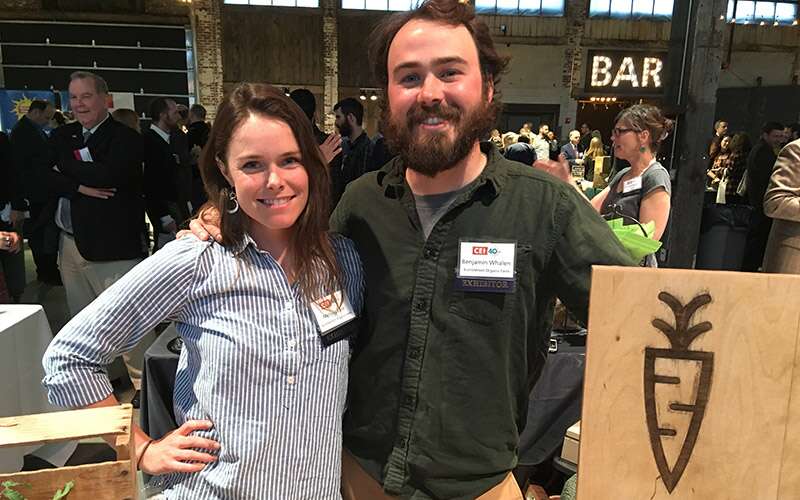
Bumbleroot Organic Farm is a certified organic farm located in Windham founded by Melissa Law, Ben Whalen and Abby and Jeff Fisher. They started small, pooling their money to buy a tractor, vegetable and flower seed and setting up a small farm on a 1.5-acre leased site in Buxton in 2014.
The farm’s co-owners are friends who met in Boulder, Colo. Each grew up outside of Maine, but they all say they came here to pursue their dreams of growing organic foods that serve the local markets.
With brisk sales from a community-supported agriculture program, farmers’ markets and restaurants they quickly outgrew that operation after two years of farming on leased land.
In 2016, through a Maine Farmland Trust program and with financing from CEI, the Bumbleroot owners bought 89 acres of farmland in Windham, invested in renovation and put five acres into production.
“We couldn’t have purchased the farm without the loan from CEI,” says Melissa Law, noting that more traditional lenders were leery about financing a startup organic farm.
Whalen says CEI also helped with a small business loan, which has provided working capital to add infrastructure such as walk-in coolers and a packing shed to keep pace with their expanding sales. Plans are now in the works to grow production acreage, add crops and customers and increase visibility by hosting events like Outstanding in the Field, a $235-per-person farm-to-table dinner.
Both Law and Whalen said being invited to CEI’s 40th anniversary celebration at Thompson’s Point in Portland, with a vendor’s table and lots of walk-through traffic, was a great opportunity to market their farm.
“This is a way of CEI supporting our business,” Whalen said. “It’s a great community to be part of.”
Seedlings to Sunflowers
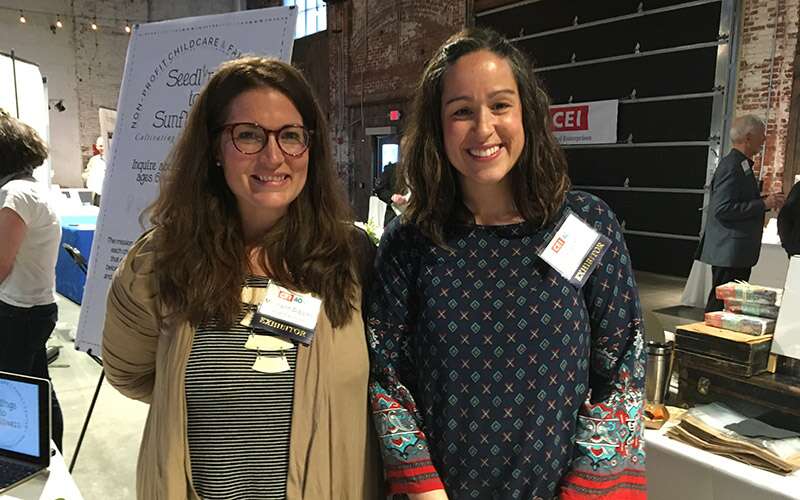
Seedlings to Sunflowers is a startup nonprofit child-care and family center in Gorham co-founded by Marissa Ritz and Meghann Carrasco.
Located at 11 South Gorham Crossing, Seedlings to Sunflowers received through CEI a $1.495 million loan from the U.S. Department of Agriculture’s Community Facilities Program and TD Bank to fund land acquisition, construction and development of a 5,300-square-foot child-care center that’s slated to open in June.
“We had this idea about a year-and-half ago,” said Carrasco, noting that both of them have a passion for educating children, with a nature-based approach that will include an onsite 18-by-24-foot greenhouse to create learning opportunities through a garden-to-table education program.
The nonprofit will offer child-care and experiential education for children ages 6 weeks to 5, as well as after-school programs for children ages 5 to 10. In Ritz’s words, the nature-based approach involves “unplugging” the children and “teaching them by doing.”
“Children are able to connect things and get excited about learning when it’s hands-on, getting their bodies engaged,” she said.
In addition to its financing help and business development mentoring, CEI is working with Seedlings to Sunflowers’ owners to help them reach their goal of creating quality jobs as well as hire 50% of their employees from low-to-moderate-income backgrounds.”
“CEI supported us in taking our dream and making a reality,” Ritz says. “They’ve been an invaluable resource throughout the entire process. Starting a business is so hard, if you’re doing it on your own. CEI’s mentoring helped to guide us as we developed our business plan.”







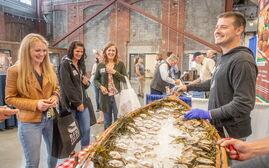






Comments